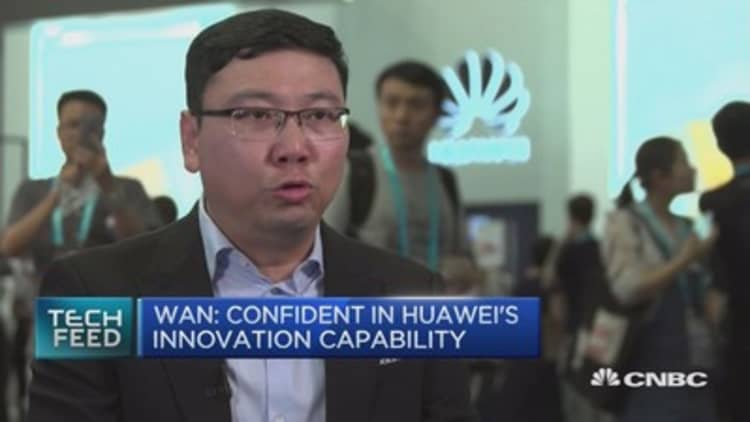
Huawei will become the top personal computer maker in the world in three to five years, leapfrogging the likes of Apple, Lenovo and HP, a top executive at the firm told CNBC on Wednesday, just days after launching new notebook devices.
In May, the Chinese firm took the wraps off of the MateBook X, MateBook D and MateBook E — the X is a laptop that competes directly with Apple's MacBook line of products. For its part, the company says it is bullish on its plans in the PC space.
"Whenever Huawei decides to enter an area, make a product, our target is always to be a global leader," said Wan Biao, chief operating officer of Huawei's consumer business group. "I think this comes from Huawei's unswerving input in R&D, and our innovation capabilities. I think these has already been proven in our smartphone products."
When asked how long it will take to sit at the top spot in the market, Wan said the "process would take about three to five years."
The PC market has been declining for several years, but it recorded 0.6 percent growth in the first quarter of 2017, according to data from IDC. Given that low growth, it's an incredibly tough market.
HP, Lenovo, Dell, Apple, and Acer make up the top five players in the world by market share, IDC said. So if Huawei becomes number one, that would mean beating out those top players. Wan, however, said he's confident.
"Of course, we are confident because of Huawei's powerful innovation capabilities. In fact, in the laptop space some technologies are the same with smartphone. In the meantime, with the development of AI, AR and VR [artificial intelligence, augmented reality and virtual reality] technologies, the chance to succeed will only grow bigger for a strong innovative company," Wan told CNBC.
Huawei's consumer business is relatively young and began with smartphones. The Chinese giant is seeing success: reported revenues in its consumer business group were up 42 percent year-on-year in 2016 to 178 billion yuan ($26.19 billion). Smartphone shipments were up 29 percent to 139 million units, and Huawei is now the third-largest smartphone vendor in the world by market share.
Wan's projection of being the top PC maker in only a few years mirrors similar bullishness from the company about smartphones. In 2016, Richard Yu, the CEO of the consumer division at Huawei, told CNBC that the firm would be number one in smartphones by 2021.
It may seem odd that Huawei is entering a stagnant market, but the tactic is to try and create an ecosystem of products for consumers. Not only does Huawei have smartphones, but it also sells smartwatches and Wi-Fi routers. Laptops are another edition to the portfolio.
"I think for Huawei's strategy, one of the most crucial points is the connectivity of all things. Every object in the world should be able to connect … Therefore Huawei is also developing our business over these notions," Wan said.





